Discover the spiritual depths of vineyards in the Bible, where ancient wisdom intertwines with timeless lessons on life and faith.

Vineyard in the Bible
While vineyards often evoke images of abundance and festivity, in the Bible, they hold a deeper, more complex symbol of spiritual truths and divine principles. You'll find that vineyards aren't just agricultural landmarks; they're woven into the fabric of biblical teachings, serving as backdrops for lessons on stewardship, judgment, and blessing.
As you explore the intricate relationship between vineyards and biblical narratives, you'll uncover layers of meaning that could reshape your understanding of these sacred texts. This journey promises to reveal insights that are both ancient and surprisingly relevant to your life today.
Key Takeaways
- Vineyards in the Bible symbolize prosperity, divine blessing, and the importance of human stewardship and spiritual diligence.
- They serve as potent metaphors for Israel's covenant relationship with God, reflecting blessings for obedience and consequences for disobedience.
- Prophetic imagery involving vineyards offers insights into spiritual growth, divine judgment, and the necessity of ethical living.
- Vineyard narratives emphasize the themes of divine-human partnership, community care, and the celebration of spiritual fruits.
The Symbolism of Vineyards
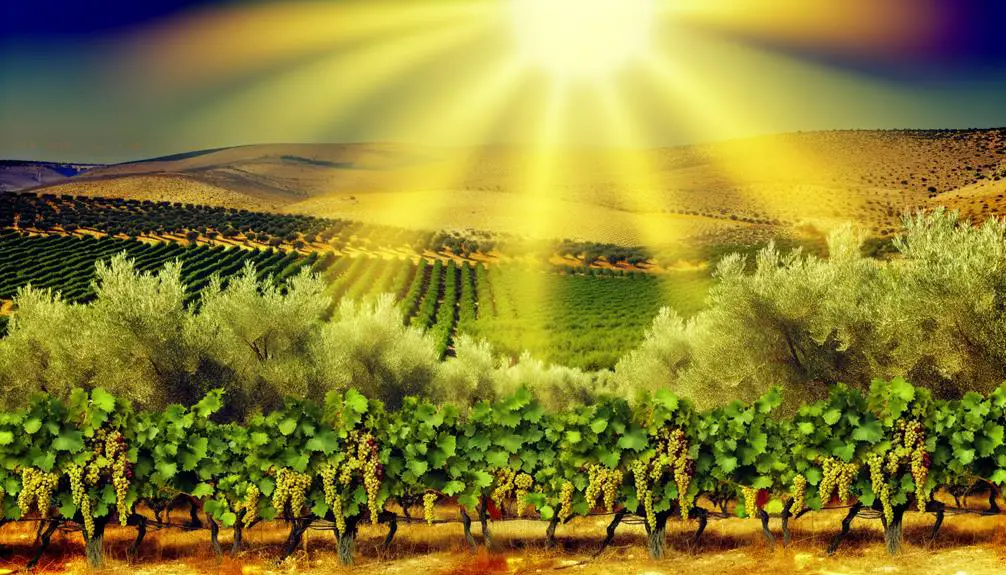
In analyzing biblical texts, it's evident that vineyards symbolize not only fertility and prosperity but also the intricate relationship between divine blessing and human stewardship. This symbolism is deeply rooted in the practice of grape cultivation, a labor-intensive process that requires dedication, patience, and skill. You're invited to consider the vineyard as a metaphor for the nurturing and care that believers are expected to extend to their faith and community.
Grape cultivation in biblical times was more than just agricultural activity; it was a testament to the relationship between people and the divine. The successful growth of grapes and the subsequent harvest celebrations were seen as direct reflections of God's favor. These celebrations weren't merely social events; they were deeply religious moments that acknowledged God's provision and the fruitfulness of the land entrusted to human care.
The process of tending to a vineyard—pruning, protecting, and harvesting—parallels the spiritual diligence required in one's faith journey. Just as a vineyard thrives under attentive care, so does one's spiritual life flourish with regular nurturing and commitment. The cycle of sowing, growing, and harvesting in these contexts serves as a powerful allegory for spiritual renewal and growth.
Moreover, the communal aspect of harvest celebrations highlights the importance of collective joy and thanksgiving in the face of divine generosity. It's a reminder that blessings aren't just personal but are meant to be shared, reinforcing the bonds within the community and with the divine. Through this detailed analysis, the profound symbolism of vineyards in biblical texts becomes clear, offering rich insights into the values of diligence, community, and divine-human partnership.
Vineyards in Old Testament Teachings
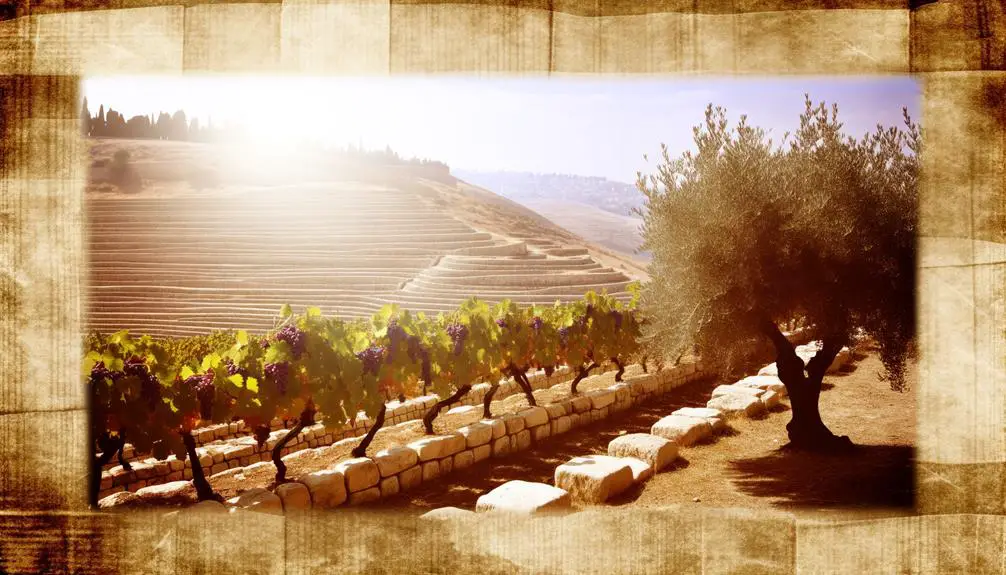
In the Old Testament, vineyards emerge as a multifaceted symbol, encapsulating notions of prosperity, divine judgment, and covenant relationships.
You'll find that vineyards in prophetic imagery often serve as a lens through which the complexities of Israel's relationship with God are explored, highlighting both blessings for obedience and consequences for disobedience.
This analysis reveals how deeply interwoven the concept of the vineyard is with the theological and moral teachings of the Old Testament, offering insights into its enduring significance.
Symbolic Vineyard Meanings
Vineyards, as depicted in Old Testament teachings, symbolize a rich tapestry of spiritual and moral lessons that resonate deeply within the fabric of biblical narratives. Through the meticulous care required for grape cultivation and the communal aspects of harvest rituals, vineyards become a powerful metaphor for the relationship between God and His people.
- Grape Cultivation: Represents the cultivation of spiritual virtues and the divine care in nurturing human souls.
- Harvest Rituals: Symbolize the gathering of the righteous and the celebration of spiritual fruits.
- Stewardship: Emphasizes the responsibility bestowed upon individuals to tend to their spiritual well-being and that of the community.
- Judgment and Reward: Illustrates the consequences of one's actions, reflecting divine justice and mercy.
These elements collectively weave an intricate narrative, underscoring the profound symbology vineyards hold within Old Testament teachings.
Vineyards in Prophetic Imagery
Building upon the symbolic meanings explored earlier, let's examine how vineyards serve as potent prophetic images within Old Testament teachings, offering deeper insights into divine messages.
Grape cultivation, deeply rooted in the agrarian society of ancient Israel, becomes a rich metaphor for spiritual growth and divine judgment. Through the lens of prophetic imagery, vineyards symbolize Israel's relationship with God, reflecting covenantal faithfulness or rebellion.
Harvest festivals, celebrated with joy for the bounty provided, are juxtaposed with prophetic warnings of judgment, where neglected vineyards yield bitter fruit. This duality underscores a profound message: just as careful tending of vineyards results in abundant harvests, so too does adherence to divine commandments bring blessings, while neglect invites desolation.
Parables Involving Vineyards
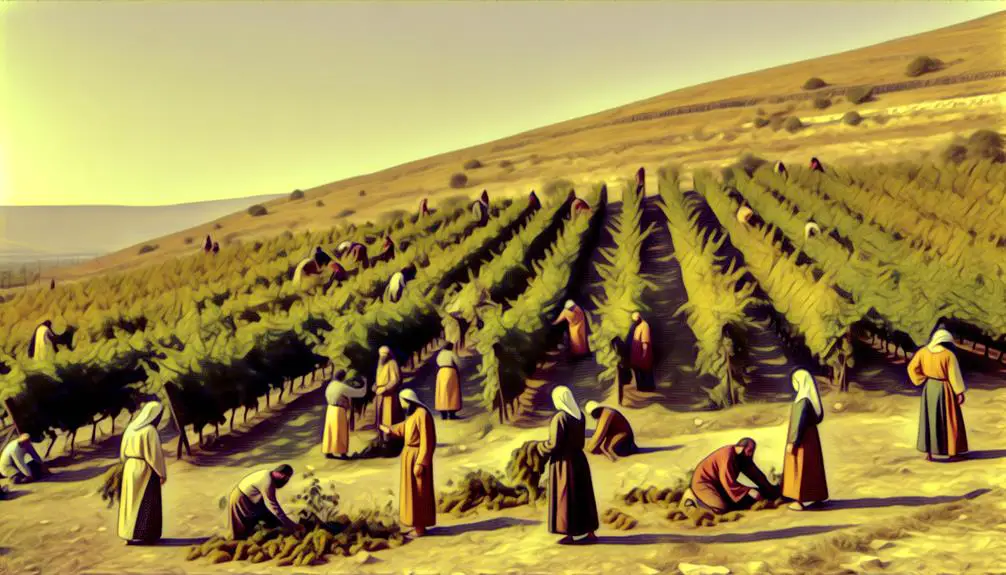
Several parables within the Bible utilize vineyards as central metaphors to unfold complex moral and spiritual lessons, inviting you to delve deeper into their symbolic significance. These stories, often rich in agricultural imagery, resonate with themes of expectation, stewardship, and divine-human relationships. Vineyards, in this context, aren't just about grape cultivation but are laden with grape expectations and echo the broader harvest parables found throughout the scriptures.
- Grape Expectations: This theme illuminates the anticipation of positive outcomes from diligently tended vineyards, paralleling the hope placed in humanity to yield spiritual fruitfulness.
- Harvest Parables: These stories use the harvest season as a metaphor for judgment and reward, underscoring the importance of readiness and accountability.
- Stewardship and Responsibility: Many vineyard parables focus on the caretakers' duty to manage the vineyard faithfully, highlighting themes of trust and ethical conduct.
- Divine-Human Relationship: The vineyard often symbolizes the relationship between God and His people, illustrating expectations, disappointments, and the potential for redemption.
In analyzing these parables, you're invited to reflect on the layered meanings behind the vineyard imagery. The vineyard becomes a vivid tableau upon which lessons of moral and spiritual significance are painted. It's not just about the physical act of growing grapes but about nurturing, expectation, and the consequences of our actions or inactions. Through these parables, the Bible communicates timeless truths about divine expectations and human responsibilities, making the vineyard a rich symbol of spiritual cultivation and harvest.
Vineyards and Divine Judgment
In biblical narratives, vineyards serve as potent symbols of divine judgment. God's wrath is vividly symbolized through their devastation. These vineyards frequently act as metaphors for judgment, illustrating how societal and individual sins lead to divine retribution.
Importantly, this destruction often heralds a call for repentance. Through the loss and suffering, there lies a path toward redemption and spiritual renewal.
God's Wrath Symbolized
Throughout biblical narratives, vineyards often serve as powerful symbols for God's wrath and divine judgment against human disobedience and moral failure. This imagery captures the severity of consequences when divine commands are neglected. The destruction of grapes and the failure of harvests within these narratives aren't mere agricultural mishaps but are imbued with profound theological significance. They symbolize the disruption of divine-human relationships and the inevitable suffering that follows moral decay.
- Grapes' destruction highlights the vulnerability of human achievements without divine favor.
- Harvest failure serves as a reminder of the fragility of human prosperity under divine judgment.
- Vineyards become a metaphor for the delicate balance between divine blessing and wrath.
- The cyclical nature of growth and decay in vineyards mirrors the consequences of moral choices.
Vineyards as Judgment Metaphors
Building on the understanding of vineyards as symbols of divine wrath, it's crucial to explore how they also serve as metaphors for judgment in biblical narratives, reflecting the consequences of straying from God's commandments. The meticulous attention to grape cultivation and the precision in harvest rituals in these stories aren't merely agricultural practices but symbolize the divine expectation of moral and spiritual fruitfulness from humanity.
When the vineyard, representing the people, fails to produce good fruit, it becomes a vivid illustration of divine judgment. This metaphor extends beyond the physical destruction of vines to a deeper, spiritual reckoning, showcasing the severe implications of neglecting one's duties to uphold divine laws.
The vineyard, thus, becomes a stage where the drama of divine justice unfolds, highlighting the critical importance of obedience and righteousness.
Repentance Through Devastation
The devastating loss of a vineyard often serves as a divine wake-up call, urging repentance and a return to spiritual fidelity. This motif underlines a broader theological narrative where calamity leads to self-reflection and transformation. It's not merely about the physical loss but a deeper, spiritual realignment.
- Divine Intervention: Illustrates how tragedy prompts a reassessment of one's spiritual path.
- Climate Adaptation: Signals the importance of adjusting agricultural practices to avert future devastations.
- Moral Rectitude: Encourages a shift towards ethical living and stewardship of the earth.
- Community Resilience: Highlights the collective effort required to rebuild and adapt in the face of adversity.
This analysis demonstrates the layered significance of vineyard losses, intertwining climate adaptation and agricultural practices with spiritual renewal and community resilience.
Vineyard Care and Stewardship
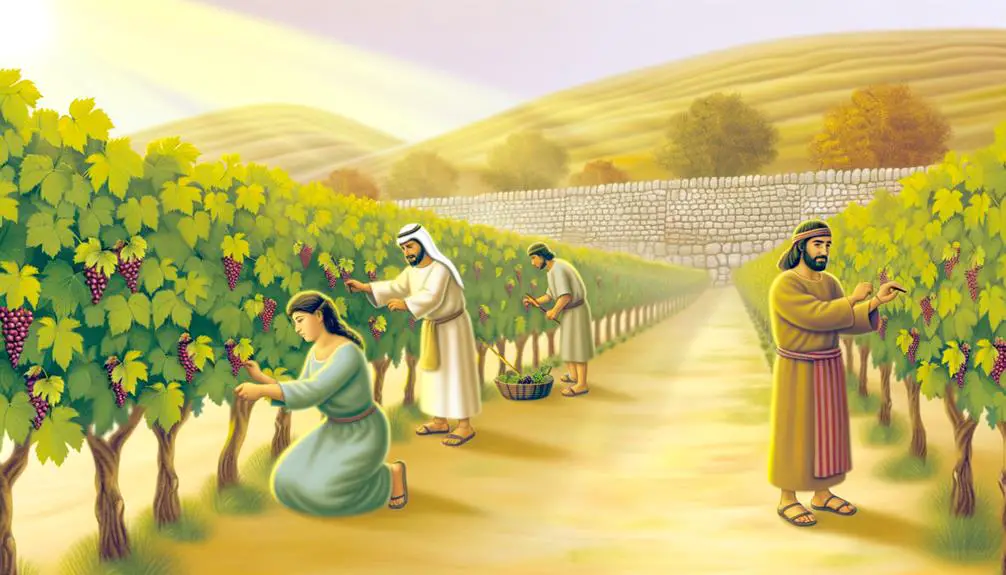
Caring for a vineyard requires meticulous attention to detail and an understanding of the specific needs of the vines to ensure their optimal growth and fruit production. A critical aspect of this stewardship involves grape selection and harvest timing, which are foundational to achieving high-quality wine. The choice of grape variety must align with the climate, soil, and topography of the vineyard, as these factors directly affect the vine's health and the grape's flavor profile. Moreover, determining the perfect moment to harvest is pivotal. Too early, and the grapes may lack the desired sugar levels; too late, and they might become overripe, leading to an unbalanced wine.
Your decisions on vineyard care significantly impact the vine's resilience and yield. Regular pruning, for instance, is essential for controlling vine growth, ensuring that the plant's energy is directed towards producing a manageable number of high-quality grapes. This practice not only influences the current season's yield but also the vine's longevity and productivity in future seasons.
Aspect |
Importance |
Outcome |
|---|---|---|
Grape Selection |
Aligns with environmental factors |
Ensures optimal grape quality |
Harvest Timing |
Matches grape maturity |
Balances sugar and acidity |
Pruning |
Controls growth and health |
Enhances yield and vine health |
This table summarizes key considerations in vineyard care and stewardship, underscoring the importance of informed decision-making in the cultivation process. By integrating these practices, you're not just growing grapes; you're crafting the foundation of what can become a remarkable wine, reflecting both your dedication and the unique character of your vineyard.
Blessings Associated With Vineyards
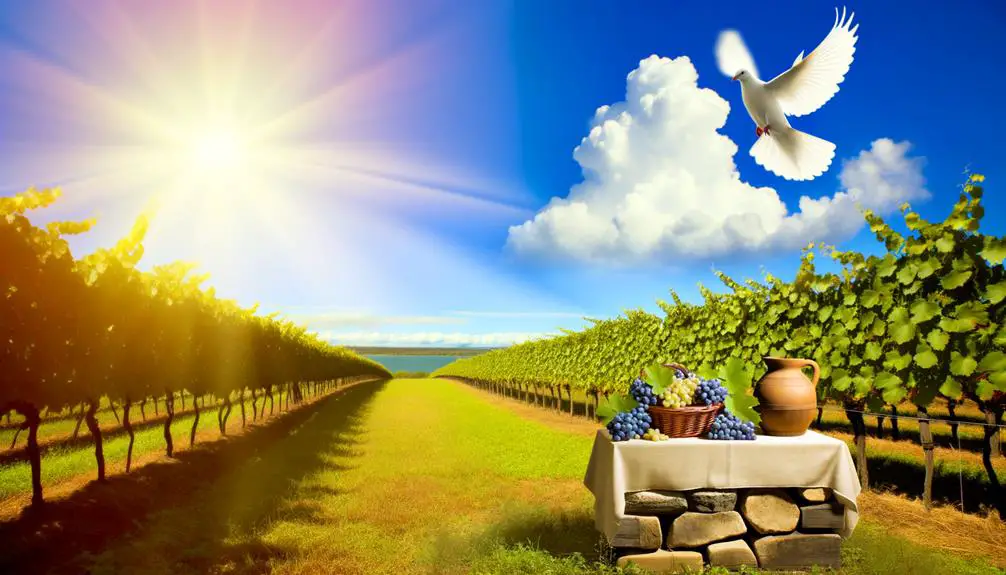
While meticulous stewardship of vineyards lays the groundwork for quality wine production, it's also essential to recognize the myriad blessings vineyards bestow, ranging from economic prosperity to cultural significance. The cultivation of grapes goes beyond mere agriculture; it's deeply woven into the fabric of societies, offering both tangible and intangible benefits. Vineyards have historically been centers of economic activity, providing employment and contributing significantly to local and national economies through the production of wine and other grape-derived products.
The blessings associated with vineyards include:
- Economic Prosperity: Grape cultivation is a significant agricultural activity that contributes to the economic well-being of regions renowned for their vineyards. It generates employment opportunities in cultivation, harvesting, processing, and marketing.
- Cultural Significance: Vineyards have been central to numerous cultures, symbolizing abundance, fertility, and joy. They play a pivotal role in harvest festivals, which are occasions of communal celebration and thanksgiving.
- Environmental Benefits: Beyond their economic value, vineyards contribute to the landscape's biodiversity, offering habitats for various species and acting as important carbon sinks.
- Social Cohesion: The collective labor in vineyards, especially during harvest festivals, fosters community bonds and strengthens social ties, reinforcing a sense of belonging and mutual support among participants.
These elements underscore the multifaceted blessings vineyards provide, extending beyond the simple production of wine to encompass economic, cultural, environmental, and social dimensions. Understanding these blessings offers a deeper appreciation for the role of grape cultivation and vineyards in human history and society.
Lessons From Biblical Vineyards

Exploring vineyards in biblical contexts reveals profound lessons on stewardship, divine judgment, and the spiritual symbolism associated with grape cultivation. The narratives woven around these plots of land are rich with instructional value, emphasizing the importance of diligent care and the consequences of neglect. As you delve deeper into these stories, you'll uncover layers of meaning that resonate not only with agricultural practices but also with the cultural significance embedded within these ancient texts.
Biblical Parable |
Lesson Learned |
|---|---|
The Vineyard of Naboth |
Upholding justice and resisting greed are paramount, illustrating the dangers of coveting another's property. |
The Parable of the Workers in the Vineyard |
God's generosity often defies human expectations, highlighting the principle of divine grace rather than merit. |
The Parable of the Wicked Tenants |
Stewardship entails accountability; mismanagement and disregard for the rightful owner lead to severe consequences. |
Isaiah's Song of the Vineyard |
The expectation of fruitfulness from well-tended vineyards serves as a metaphor for spiritual and moral productivity. |
Jesus' True Vine Discourse |
Abiding in Christ, the true vine, is essential for spiritual growth and fruitfulness, emphasizing the need for personal connection with the divine. |
These vignettes, rich in agricultural metaphors, offer a layered understanding of responsibility, justice, and divine-human relationships. They underscore the critical role of stewardship, both in the context of land and in the broader spiritual sense. As you reflect on these lessons, consider how the principles of care, accountability, and connection to the source can influence your own life and community.
Frequently Asked Questions
How Have Modern Archaeological Findings Impacted Our Understanding of Ancient Vineyard Management Techniques Mentioned in the Bible?
Modern archaeological findings have revolutionized your understanding of ancient vineyard management techniques. By analyzing soil composition and uncovering ancient irrigation methods, you've gained insights into how early vineyards thrived.
These discoveries not only validate historical accounts but also offer a detailed picture of agricultural practices. This scholarly approach has deepened your appreciation for ancient viticulture, highlighting the sophistication and ingenuity of early farmers in optimizing their resources for vineyard cultivation.
Are There Specific Grape Varieties Mentioned in the Bible, and if So, How Do They Compare to Modern Grape Varieties Used in Wine Production?
You're diving into whether specific grape varieties are mentioned in biblical texts and their modern counterparts. Interestingly, ancient texts reference grapes, but not specific varieties. This contrasts with today's detailed categorization for wine production.
Your exploration touches on grape preservation and wine rituals, revealing a rich history of viticulture. While ancient practices lacked modern classification, they laid the groundwork for today's sophisticated wine rituals, showcasing an evolution from broad references to precise varietal identification.
In What Ways Have Cultural Perceptions of Vineyards Evolved From Biblical Times to the Present, Especially in Regions Outside of the Middle East?
Cultural perceptions of vineyards have drastically evolved over time. Initially, grape symbolism and vineyards were tightly woven into religious ceremonies, representing fertility, prosperity, and divine blessing.
Today, you'll find vineyards symbolize craftsmanship, heritage, and leisure, especially outside the Middle East. This shift reflects broader societal changes, as vineyards now play a pivotal role in gastronomy and tourism, moving away from their solemn, sacred origins to embrace a more secular, universal appeal.
How Did Vineyard Ownership and the Economics of Wine Production in Biblical Times Influence Social and Political Structures?
In biblical times, vineyard ownership and wine production significantly impacted social and political structures. You'd find that religious symbolism and harvest festivals were deeply intertwined with these practices.
Vineyards weren't just agricultural assets; they were symbols of wealth and power. The owners wielded considerable influence in society, shaping laws and customs.
This deep-rooted connection between vineyards, religion, and governance illustrated how essential wine was in ancient cultural and political landscapes.
Can the Concept of Vineyards in the Bible Be Linked to Environmental Stewardship and Sustainability Practices in Contemporary Vineyard Management?
You can indeed link the concept of vineyards to modern environmental stewardship and sustainability practices. By analyzing religious symbolism and vineyard parables, you'll find a rich foundation for responsible land use and ecological balance.
These ancient narratives often emphasize stewardship of the earth, mirroring today's sustainability goals in vineyard management. This approach not only respects historical practices but also aligns with contemporary efforts to maintain the health of our planet.
Conclusion
In conclusion, vineyards in the Bible aren't merely agricultural elements but are imbued with profound symbolism. They serve as metaphors for God's relationship with His people, embodying themes of care, judgment, and blessing.
Through parables and teachings, vineyards illustrate lessons of stewardship, divine expectation, and the rewards for faithfulness. Analyzing these biblical narratives reveals the rich layers of meaning behind vineyards, offering insights into spiritual truths and divine principles that remain relevant for contemporary reflection and application.



Sign up